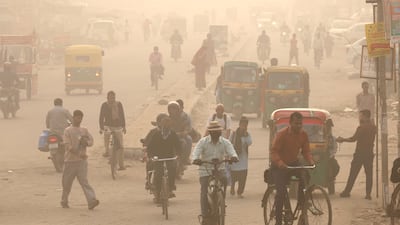Dangerous smog engulfing India and Pakistan's cities could be tackled by planting more trees, building homes off-site and composting rice straw instead of setting fire to harvested fields, experts have told The National.
Delegates at the Cop29 climate talks in Azerbaijan called for nature-friendly policies that tackle South Asia's pollution, waste and extreme weather problems in one stroke. India's government has told the summit it must be allowed "carbon space" to pull people out of poverty despite the climate impact of its coal use.
The air-conditioned negotiating rooms and crisp Baku air as winter draws breath in Azerbaijan were a stark contrast to the toxic conditions in India and Pakistan in recent days. Schools were closed in both countries due to smog, as pollution soared past safe levels.
Air quality in Delhi had improved only from "severe" to "very poor" by Thursday, while a ban on outdoor sports remained in force in Lahore. The Taj Mahal, India's famous monument of love, has been obscured by toxic smog for nearly a week. Pakistan called the smog a "national disaster". The National canvassed ideas in Baku on what could be done.

Rice fields
Delhi authorities blame India's government for not doing enough to curb crop fires in surrounding areas, as farmers burn their fields after the harvest. Crop burning helps create smog and releases fine pollutants that can infiltrate people's lungs and bloodstream.
The practice is an annual cause of pollution despite bans that led to at least 16 arrests in northern India last month. Rene van Berkel, an expert from EU-funded sustainability initiative Switch Asia, suggested composting rice straw instead, speeding up the process with enzymes that break down organic matter.

This would mean waste "can be recycled back into the soil without getting too much carbon in the soil, which then creates methane in the next cycle", he said. Farmers have previously complained that alternative equipment is too slow or expensive.
Delivering India's national statement at Cop29, Environment Minister Kirti Vardhan Singh said there was “no option but to break all barriers to flow of technology" to the developing world. Prime Minister Narendra Modi did not attend the summit, where India has no national pavilion and relatively few delegates.
Shaenandhoa Garcia Rangel, who works for the UN-backed World Conservation Monitoring Centre, said waste could be part of wider "nature-based solutions" that aim to make farms more climate-resilient and protect their biodiversity, for example by restoring soil health.
Delhi air pollution - in pictures
Planting trees
Trees can cut pollution by absorbing harmful gases such as carbon monoxide, sulphur dioxide and nitrogen dioxide. They are also used in climate strategies as a source of shade from extreme heat and as a natural "carbon sink" that removes greenhouse gases from the atmosphere.
“Instead of looking at problems individually to target them, I think we have to look into the solutions that can address multiple problems at once," said Vishwas Chitale, who works on climate resilience at the Council on Energy, Environment and Water in India.
“If we are able to increase the urban forest to a certain extent, we will be able to address some of these challenges, pollution being one of them," Mr Chitale said. He said trees were a key focus of studies into protecting cities from heat, urban flooding and pollution.
Mr Modi, who planted a tree on an official visit to Guyana on Wednesday, has encouraged people to plant saplings to honour their mothers in a scheme called One Plant in Mother’s Name. Climate plans also call for five million hectares of new tree cover in India to address forest loss caused by fires and logging.

Prefab buildings
A further "major contributor" to air pollution is cement and dust, said Mr van Berkel. He suggested it would tick several boxes to "look comprehensively" at prefabricated homes that can be constructed in safer conditions than an urban building site.
"That is avoiding the cement losses that blow into the air at construction sites and it's also more efficient and there are more climate benefits in there," he said. "We need to customise and look at specific solutions for pollution and waste."
Pakistan told Cop29 it will make the more efficient use of resources a "central pillar" of its next five-year climate plan. It will consider specific targets to use fewer resources in construction, farming and industry, said Romena Alam, a climate co-ordinator in the prime ministerial office.
Foreign Minister Muhammad Ishaq Dar separately told a meeting on extreme weather in Baku that early warning systems would be "essential for resilience" in Pakistan, due to floods, heatwaves, bursting lakes and erratic rainfall.












